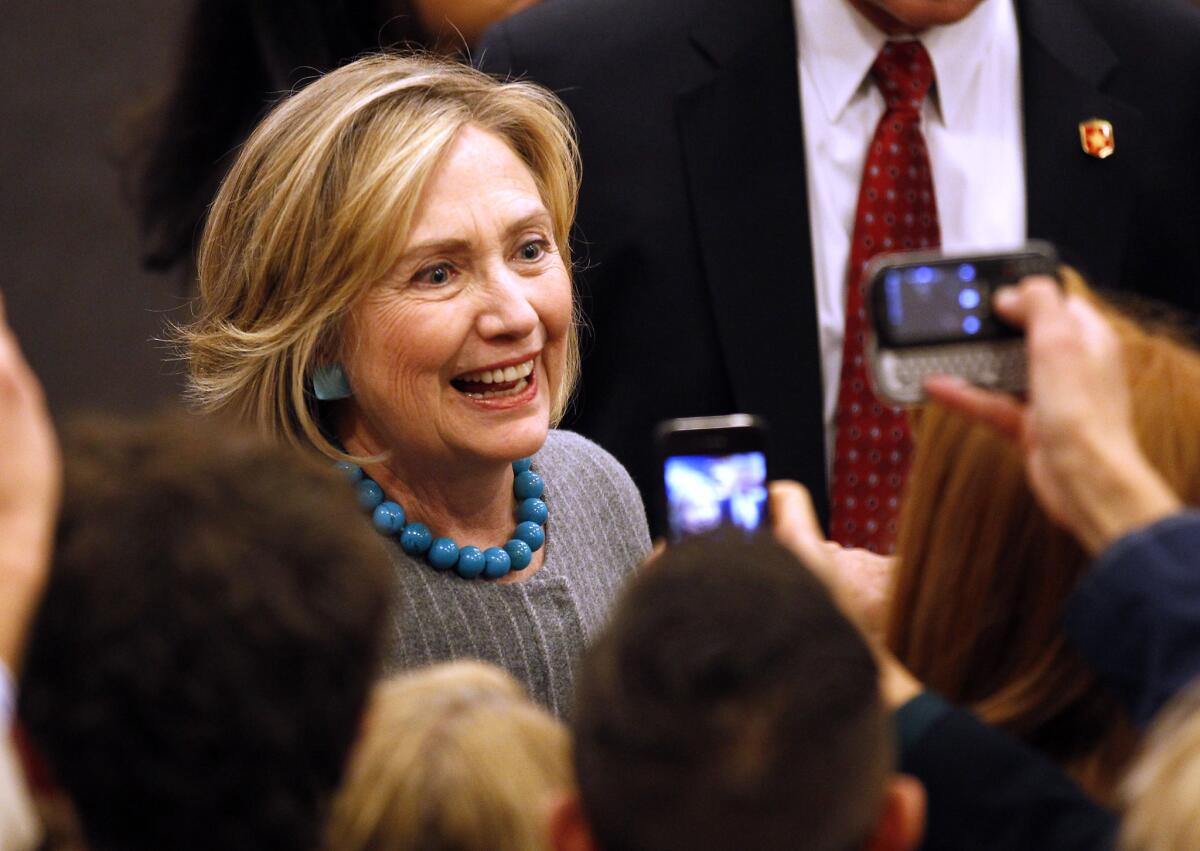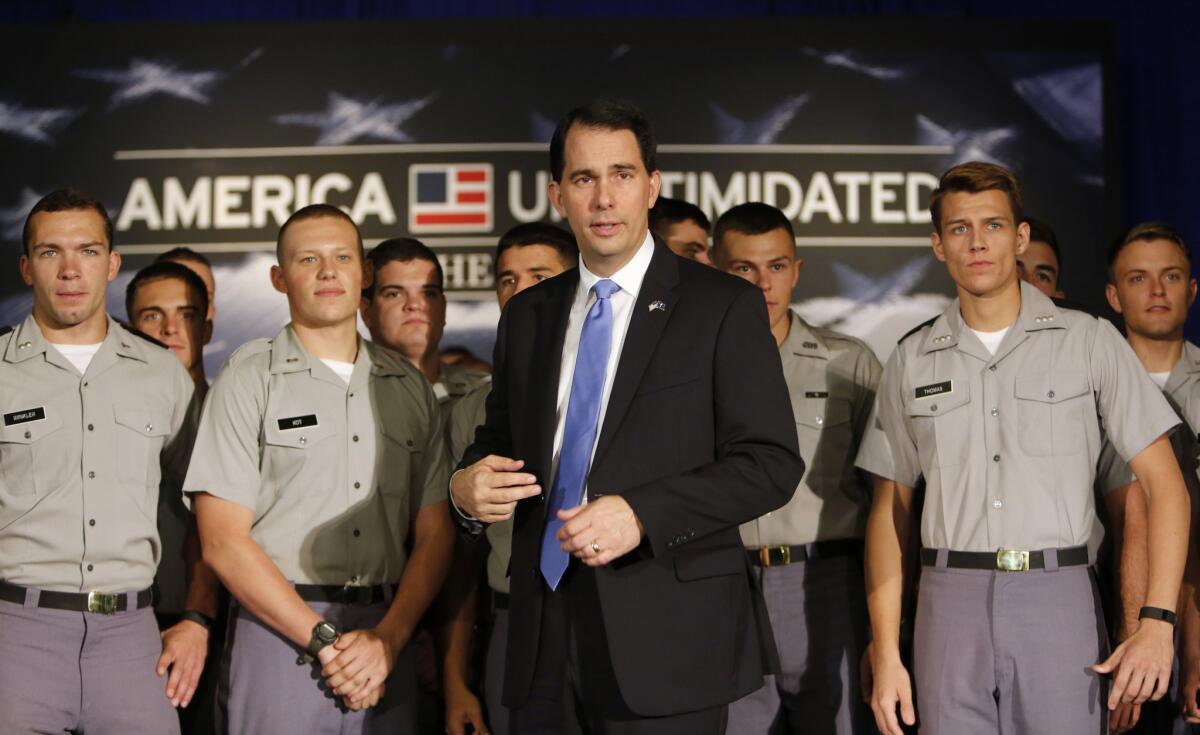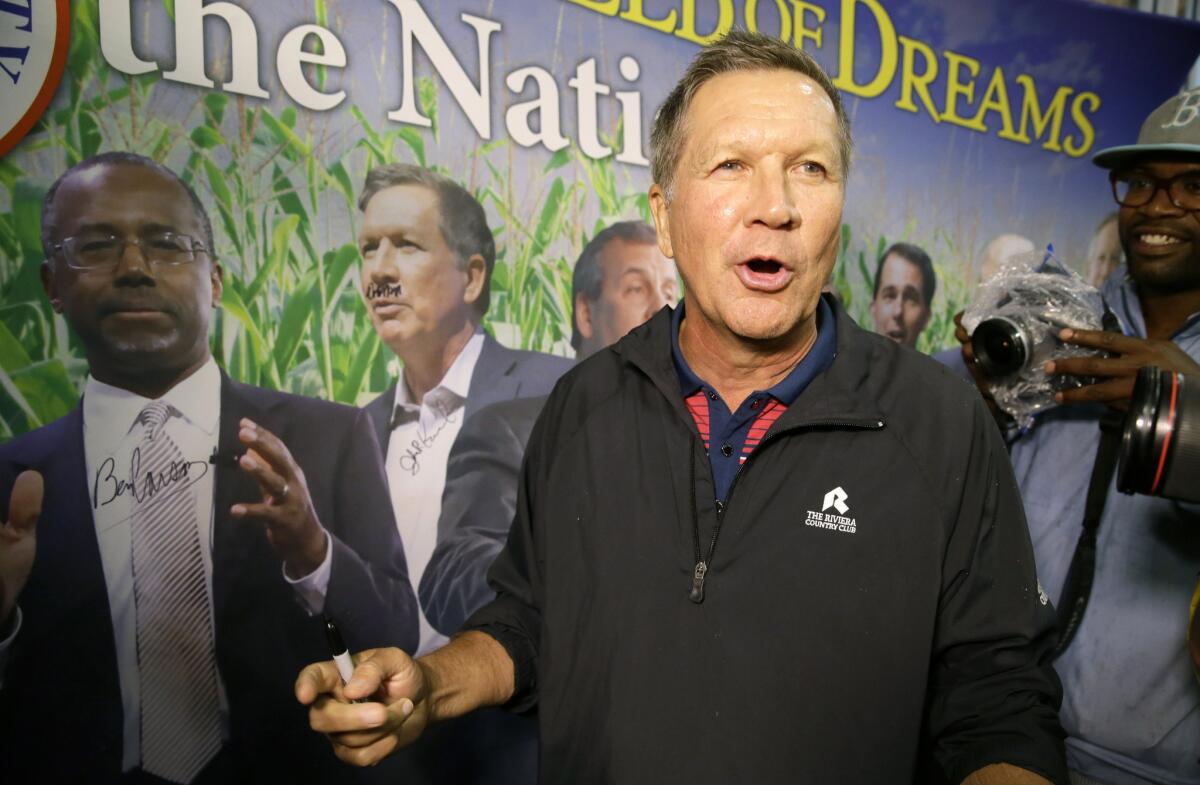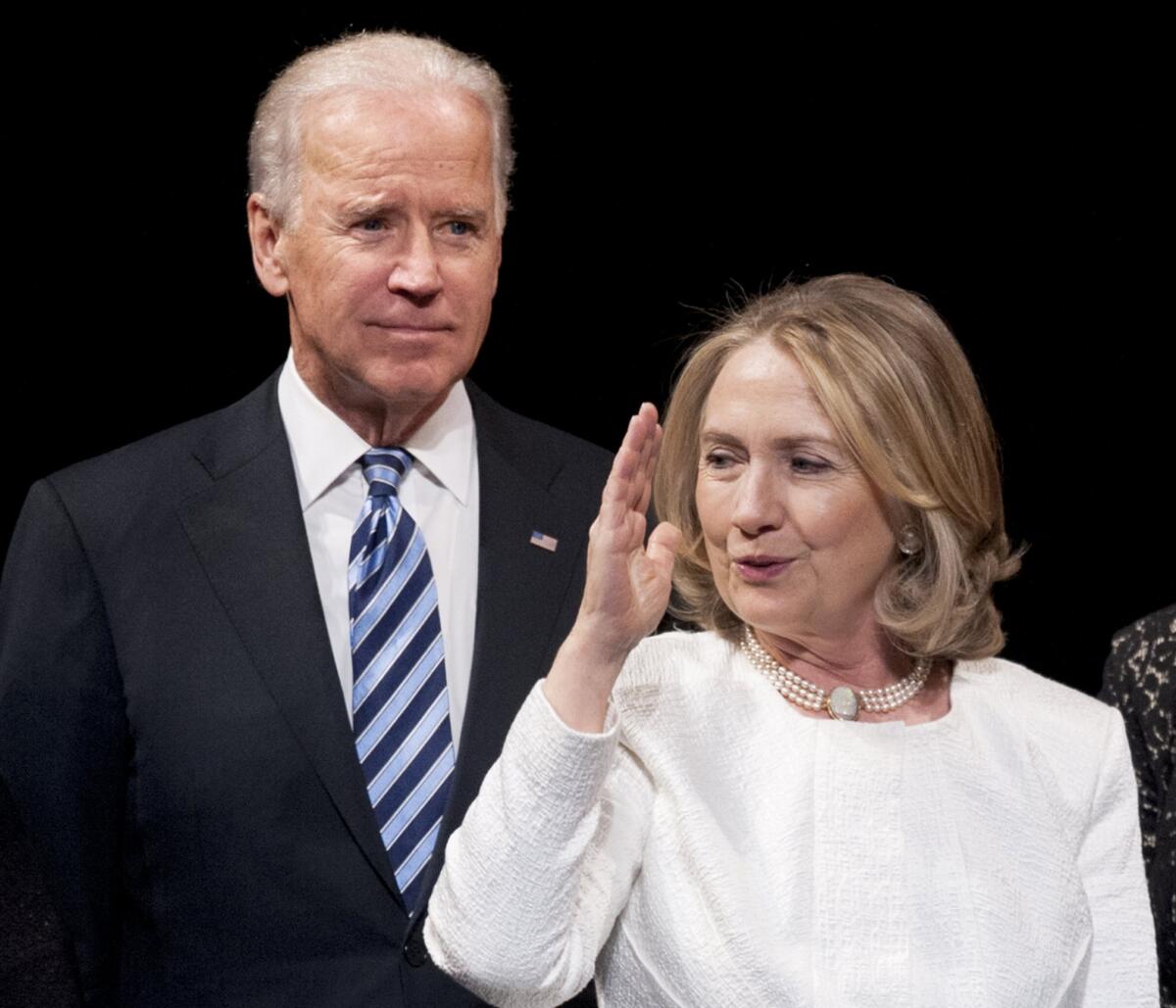Hillary Clinton strikes a new tone on e-mail
- Share via
By the numbers
Welcome to Trail Guide, your daily tour along the road to the White House. It's Friday, Aug. 28, and this is what we're watching:
- Amid growing public unease, Hillary Rodham Clinton changes her tone in responding to questions about her email.
- "Little Bunny Frou Frou" on the menu at Clinton's upcoming Los Angeles fundraiser?
- S cott Walker and Marco Rubio try to get back some of the spotlight .
- Martin O'Malley rails against the Democratic establishment -- at a Democratic establishment event.
About those Hillary Clinton 'trustworthiness' poll numbers
Hillary Rodham Clinton's team has long scoffed at polling that shows voter concern about her trustworthiness and honesty. Clinton herself has even dismissed it as voters' confusion amid all the attacks directed at her by enemies on the right.
The campaign suggests such numbers are overshadowed by the candidate's deep support among Democratic voters nationwide, reflected in her commanding lead in the race for the party's nomination.
But it has become clear in recent days that the numbers do matter, particularly as Clinton finds herself unable to contain growing public unease with her emailing practices while secretary of State. Key Democrats are anxious over the way the campaign has handled the scandal, and they are eager to see Clinton confront the impression among a large swath of voters that she lacks honesty.
In recent weeks, the campaign's shifting approach to the problem has been clear. After a news conference in Nevada, where a visibly agitated Clinton responded with sarcasm and annoyance to questions about her use of a private server for government business, the candidate's tone changed. By the time she arrived in Iowa for a campaign event Wednesday, she was contrite. "I know people have raised questions about my email use as secretary of State, and I understand why," she said. "I get it."
In Minneapolis on Friday, she again used a careful tone. "I'm trying to do a better job of explaining to people what is going on," she said at a news conference.
It is not just supporters of Vice President Joe Biden who are keeping a close watch on how Clinton is handling the matter. Donors and other influential Democrats are looking for assurance that Clinton will be able to move past the controversy. It won't be easy. The issue is not going away anytime soon.
The email practices are at the center of multiple government investigations -- including one by the FBI -- and the State Department is under a court order to publicly release each month thousands of previously undisclosed emails sent and received by Clinton while she was at the State Department, with the latest batch due Monday.
By late October, Clinton will be testifying on the email matter on Capitol Hill, before a committee dominated by Republicans eager to inflict damage. Democrats are hopeful the GOP will overreach -- the way it did with their aggressive pursuit of some of the scandals that emerged during the Bill Clinton years -- and the public will ultimately tire of the spectacle. But at the moment, public opinion is shifting in a worrying direction for Democrats. In a recent CNN poll, 56% of voters said Clinton did something wrong by using private email for government work.
A scholar argues Donald Trump is elevating the national discourse
Donald Trump gets credit for a lot of things, but elevating the nation's political discussion is not generally one of them. One well-regarded California scholar says that maybe it is time to give Trump props for getting people talking about substantive policy issues.
"He's been starting many conversations, around dinner tables, at community centers and PTA meetings, about things like birthright citizenship, that people typically don't spend a lot of time thinking about," UCLA political scientist Lynn Vavreck told The Times' Mark Barabak. "If you value democratic discourse and you want people to engage in politics, then this thing that's happening is actually a potentially remarkable moment."
Clinton to visit Los Angeles ATM for two September fundraisers

Hillary Rodham Clinton will be back in Los Angeles to raise money next month, with at least two high-dollar events on tap -- one on the 16th floor rooftop of a swanky downtown French bistro.
The former secretary of State, embroiled in an increasingly interesting Democratic primary, will appear at the home of Rob and Shari Friedman near UCLA on the afternoon of Sept. 27. That evening, she will appear at the Perch Rooftop on South Hill Street. The site boasts spectacular city views, several fireplaces, frequent DJs and jazz performances.
The details come from two invitations obtained by the Los Angeles Times. The Clinton campaign declined to comment.
Friedman, co-chairman of Lionsgate's Motion Picture Group, was previously co-chairman and chief executive of Twilight Saga studio Summit Entertainment, which Lionsgate bought in early 2012 for $412.5 million. Lionsgate is the studio behind young adult franchises such as "The Hunger Games" and "Divergent" and also films including "Now You See Me" and "The Expendables." He also was chairman of the board of the organizing committee for the Special Olympics World Games in Los Angeles this summer.
The couple has contributed more than $100,000 to political candidates -- Republican and Democrat -- in Los Angeles city and county campaigns, as well as state and federal campaigns, since 1997, according to Los Angeles Times data. They each gave Clinton the maximum individual donation in May. They did not give her campaign money in 2008, nor did they contribute to her then-primary rival Barack Obama, despite having contributed to his 2004 Senate bid in Illinois.
Public records for their 5091-square-foot, 6-bedroom, 6-bathroom home near UCLA show it had a $4.06 million taxable value in tax year 2014.
The September events are being framed as "conversations" with Clinton. The Friedman fundraiser costs $1,000 per person, dubbed a "friend," or $2,700 to join a photo reception as a "champion." Cohosts must raise $27,000 and are entitled to a host reception with the candidate. The downtown event is $2,700 to attend and get a photo with Clinton, and $27,000 for the same cohost offer.
"Space is limited," but "both will be incredible events," one organizer said in his pitch to a potential donor. The organizer referred to the former first lady as "Hillary" throughout the email.
Clinton announced in July that she had raised $45 million through the end of the second quarter. These events come just before the end of the third quarter.
Perch's capacity is 150 on its 16th-floor rooftop, though an events person said Friday they were not aware of any fundraisers scheduled for Clinton next month.
It is billed on its website as an "elevated resting place" that serves Parisian-inspired cocktails. One of the more unusual items on a menu described as "playful" is called LITTLE BUNNY FROU FROU -- ravioli of rabbit, heirloom carrots, parsnip-brioche crumble, salami. It's $22.
There is no time specified on the fundraising invitation, but Perch warns anyone there after 9 p.m. must be old enough to drink.
Maloy Moore and Ryan Faughnder contributed to this report.
Editors' note: Like this post? Expect a lot more like it this campaign season as we expand our political coverage and create a new politics hub -- one place for everything you want to know, analysis from our award-winning journalists, breaking political news, live feeds from the campaign trail and the reporting you trust most. You can help us as we craft it by filling out this survey.
Martin O'Malley rails against Democratic party debate calendar
Former Maryland Gov. Martin O'Malley on Friday used his 15 minutes in front of the Democratic party faithful to rail against his party's decision to limit presidential debates, saying it is silencing dissent and allowing Republicans to "traffic in immigrant hate" unchallenged.
"Four debates and four debates only we are told, and not asked," he said in a passionate speech at the party's summer meeting in Minneapolis. "How does this help us tell the story of the last eight years of Democratic progress? How does this promote our Democratic ideas ?"
"Is this how the Democratic Party selects its nominee?" he asked.
The party has sanctioned six primary debates, with the first set for mid-October. Just four will take place before the Iowa caucuses in February.
O'Malley noted that Republicans already held their first primary debate in early August, where they put "backward ideas forward before an audience of more than 20 million Americans," he said. "We put our forward-thinking ideas on the back burner, as if we're trying to hide them ... we respond with crickets, tumbleweeds."
O'Malley has reason to complain about the schedule. His campaign has struggled to win attention amid a race that has been dominated by front-runner Hillary Rodham Clinton and her chief rival, Vermont Sen. Bernie Sanders. O'Malley has suggested that the party has delayed and limited the debate schedule to protect Clinton.
Republicans have sanctioned nine to 12 debates and also barred participants from appearing in outside debates.
Scott Walker and Marco Rubio try to get back in the conversation

Wisconsin governor and Republican presidential candidate Scott Walker stands with cadets Friday after giving a foreign policy speech at the Citadel in Charleston, S.C.
As the media spotlight remained focus on Donald Trump's bombast and Joe Biden's big decision, two other contenders tried to gain some attention on Friday.
Wisconsin Gov. Scott Walker and Florida Sen. Marco Rubio, both Republicans, worked to get themselves back in the nation's political conversation by delivering aggressive foreign policy speeches. Both politicians, predictably, accused the Obama administration of abdicating American leadership -- though Rubio focused on China and Walker focused on the Middle East. They had harsh words for former Secretary of State Hillary Rodham Clinton, the Democratic front-runner.
Noah Bierman writes that the men spoke just a few miles from one another in Charleston, S.C., an early primary state, where each has struggled in recent polls as Trump builds on his lead in the Republican field.
Hillary Clinton says Biden buzz is not slowing her down
Hillary Rodham Clinton said she doesn't think the prospect of Joe Biden making a late entry into the presidential race will get in the way of her locking down support from Democrats.
Speaking to reporters at a party meeting Friday, Clinton said she did not believe many Democrats where waiting on the sidelines, reluctant to sign on with Clinton before they knew whether Biden planned to get in.
"I haven't seen any evidence of that," Clinton said. "We picked up additional support yesterday and even today."
Clinton's campaign has been working to secure as much support as possible early despite her status as the clear front-runner in the primary. Amid news that her campaign had commitments from nearly 20% of the delegates needed to win the party nomination, Clinton said the early focus on the party mechanics was a "lesson" from her defeat in 2008.
"I got a lot of votes," she said of the heated primary against Barack Obama. "But I didn't get enough delegates. I think it's understandable that my focus is going to be on delegates."
Clinton's strategy serves as a sort of warning sign to Biden, who is contemplating a challenge. Her jump-start in nailing down party support and donors could complicate a bid by him.
But some Democrats believe a lack of enthusiasm for Clinton's candidacy shows there's still room. As Clinton on Friday addressed the meeting of the Democratic National Committee, she sought to show she could fire up a room of party diehards.
Clinton's standard stump speech turned feisty as she mocked the GOP front-runner for his politics and his famous fluff of blond hair.
"A lot of people have said a lot of things about my hair over the years," Clinton said, saying she relates to Donald Trump on this one issue. "And if anyone wonders if mine is real, here is the answer. The hair is real, the color is not.
"And come to think of it, I wonder if that is true for Donald too," Clinton said.
Clinton linked the rest of the Republicans to Trump and his policies on immigration and women's health.
"Today the party of Lincoln has become the party of Trump," she said, looking ahead to a potential general election matchup.
"Trump actually said he would do a much better job for women than I would," Clinton said. "That's a general election debate that is going to be a lot of fun."
Hillary Rodham Clinton tries to train Fox News reporter on press conference etiquette
Hillary Clinton jumps into the Trump hair discussion
Draft Biden making the hard sell at DNC meeting
John Kasich has one key thing in common with Donald Trump

Ohio Gov. John Kasich, who’s seeking the Republican nomination for president, drew a mustache on a photo of himself at the Iowa State Fair last week. The move was in keeping with the spontaneous spirit Kasich likes to display on the campaign trail -- and that he likes to remind audiences about.
Ohio Gov. John Kasich might seem the anti-Trump. Kasich is a longtime member of the establishment, having served in government for decades, including an 18-year stint in Congress, during part of which he chaired the Budget Committee.
But the two men share one thing in common: They are blunt.
Kasich's fondness for straight talk is serving him well on the campaign trail. While the governor may be overshadowed by Trump's mega-moment, he is having a moment of his own, solidifying key endorsements and rising to second place behind Trump in the latest poll of New Hampshire Republicans, Noah Bierman writes in this profile.
"I'm not like stuck anywhere," Kasich said in an interview with Bierman. "I don't have a teleprompter. I don't have talking points. I mean I study issues. People used to say, 'Well, you know, he's undisciplined.' Do you think I have been? ... I'm having a ball."
As Democrats meet, the absent Joe Biden is all anyone is talking about

Over the last quarter of a century or so, Hillary Rodham Clinton and Joe Biden, shown above in Washington in 2013, have collaborated and competed, shared more than a dozen staff members, and served in President Obama’s Cabinet. Now, their long relationship is being tested as he considers a presidential run.
Most of the Democratic presidential candidates will be making their pitches to the party diehards on Friday, but the talk of the Democratic National Committee summer meeting in Minneapolis is one potential candidate who won't be here.
Vice President Joe Biden's deliberations over making a late entry in the race have been the talk in the hallways outside the meeting rooms where the party stalwarts are conducting more mundane business. A gathering that months ago would have looked like it was set to be a low-drama Hillary Rodham Clinton lovefest has crackled with a bit of intrigue.
The will-he-won't-he speculation exposes the lingering divisions and doubts among Democrats. There are the progressives who've aligned behind Sen. Bernie Sanders' bid and see no need for another Clinton alternative. There are the Obama partisans with memories of the 2008 primary fight who are still wary of Clinton and her operation. There are folks newly frustrated with Clinton's handling of a summer of controversy over her use of a private email server as secretary of State and wondering whether Biden is the back-up candidate they need. And there are, of course, the Clinton loyalists who want to tamp down the talk and move on.
"It makes people anxious," said former Pennsylvania Gov. Ed Rendell, a Clinton supporter.
Of course, Democrats technically already have a primary fight on their hands. Sanders' surprising rise in the polls in New Hampshire and ability to draw large crowds has given Clinton more of a fight than many expected.
But it's clear Democrats here see a Clinton-Biden primary fight as another animal. It would divide the party not along clear ideological lines -- as Sanders' bid does -- but between personalities. It could become about Clinton's weaknesses as a candidate -- her history and her trouble winning a slice of white, working-class voters. It has the potential to be negative. It could get personal.
"It's a fight we don't want to see happen," Rendell said. "For many of us, it would be like if your two children wanted the same job. It would be gut-wrenching."
Ahead of the meeting, Biden, whose son Beau died in this spring, spoke with Democratic party chairs on a conference call about Iran, but noted when asked about a bid that he was weighing whether he had the "emotional fuel at this time to run."
While Biden deliberates, Clinton's campaign has been trying to send a message that it's locked down resources, talent and support -- a subtle boxing-out of Biden before he's in the game. Clinton released memos outlining her strengths in the four early primary/caucus states of Iowa, New Hampshire, Nevada and South Carolina, the New York Times reported. Her campaign announced new agreements that allow it to jointly raise money with state parties in Mississippi, New Hampshire, Virginia and Wisconsin.
The DNC announced a similar agreement Thursday with the Clinton campaign, although it said the agreement was not a sign of bias in favor of that camp and hoped to sign agreements with other campaigns soon.
"We are building the organization we will need now to make sure that whoever our nominee is, they are in the best possible position to win next November," said DNC chair Debbie Wasserman Schultz.
Almost the full field of candidates is slated to speak to the group Friday, including Clinton, Sanders, former Maryland Gov. Martin O'Malley and former Rhode Island Gov. Lincoln Chafee. Former Virginia Sen. Jim Webb is not on the schedule.
Some folks in Minneapolis hoped Clinton would use the chance to speak more directly about the troubles that have led some to go looking for another candidate. Clinton's use of a personal email account for government business and her handling of questions over the release of those emails is view by some Democrats as a self-inflicted wound -- and one that can only be repaired by straight talk from the candidate herself. She took a step in that direction on Wednesday, acknowledging that using the private email was "clearly not the best choice."
DNC vice chair and former Minneapolis Mayor R.T. Rybak said Thursday that he saw a real opportunity for Clinton to make a needed breakthrough.
"She is one step away from a incredibly close connection with the American people. They've seen her through ups and downs. They've see her through political challenges. They've see her through personal challenges," he said. "I think that the test of this will be how much she can recognize that authenticity is everything right now."
Scott Walker and Marco Rubio to lay out foreign policy visions in South Carolina
Two Republican presidential hopefuls will look to solidify their foreign policy credentials today, delivering speeches in South Carolina that will touch on U.S. relations with China and efforts to defeat Islamic State extremists.
Wisconsin Gov. Scott Walker, who has been assailed by some critics as being a neophyte when it comes issues abroad, is set to speak at the Citadel, the military college where several White House hopefuls, including Sen. Rand Paul of Kentucky and former Texas Gov. Rick Perry, have delivered speeches in recent years. He's expected to talk about the need to fight Islamic State, also known as ISIS or ISIL, which controls large swaths of Iraq and Syria.
"Consider ISIS, the best-armed and best-funded terrorist organization in the world," Walker says in excerpts from the speech provided by the campaign ahead of delivery. "By the grace of God, and by the strength of men and women like you, America can and will defeat this threat and eradicate this evil."
Walker, who is polling toward the middle of the crowded GOP presidential field, has sought to solidify his foreign policy credentials by traveling overseas. In February, he visited London's prestigious Chatham House, where he made headlines when he declined to take questions.
Meanwhile, not far from where Walker is set to speak, Sen. Marco Rubio of Florida is scheduled to deliver an address at the Charleston Metro Chamber's World Trade Center. Rubio, a South Florida native who in recent months has castigated the Obama administration's restoration of diplomatic relations with Cuba, is expected to talk about what he see as threats that China poses to the United States.
"China presents both opportunities and challenges. Trade with its growing middle class has opened American businesses to hundreds of millions of new customers," he wrote in a Wall Street Journal op-ed Thursday. "But Beijing's protectionist economic and trade policies increasingly endanger America's financial well-being. China is also a rising threat to U.S. national security. Earlier this year, it was behind the largest cyber attack ever carried out against the United States."
Both candidates have called on President Obama to cancel next month's official state dinner in honor of Chinese President Xi Jinping.
Their speeches come on the heels of former Florida Gov. Jeb Bush's foreign policy speech at the Ronald Reagan Presidential Library earlier this month.
Bush's back-and-forth pivots on whether he supported the Iraq war launched by his brother, former President George W. Bush, have dogged his campaign.
By the numbers
Sign up for Essential California
The most important California stories and recommendations in your inbox every morning.
You may occasionally receive promotional content from the Los Angeles Times.







